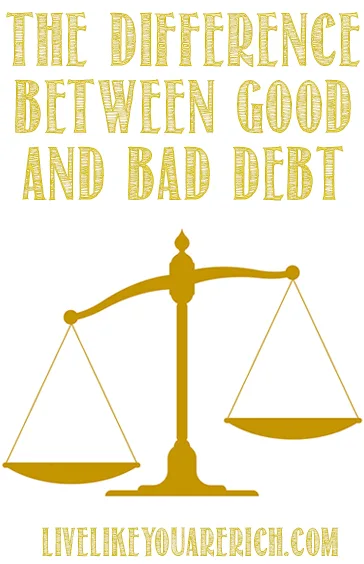There is a difference between bad debt and good debt. Most everyone reading this will relate to consumer debt. It’s the debt that comes from buying things, from paying bills, etc. Investment debt is debt used to pursue a venture (opening a business, flipping a property, etc.) that will yield you profit. And although Dave Ramsey will say all debt is bad (which I don’t agree with), Robert Kiyosaki will say that consumer debt is bad but investment debt is good-as it is a way to use money to make more money.
Example of good debt: A business loan would be an example of good debt because you are using money to make more money.
Example of bad debt: Going on a vacation and putting some of it on a credit card. This money does not make you money but accrues interest.
When deciphering debt just ask yourself: Is this debt an investment that will yield me a profit? If the answer is yes it is not the ‘BAD’ type of debt. If the answer is no, then it is most likely consumer debt that should be paid off ASAP!
That said, you should strive to pay off both types of debt. But don’t avoid good debt when a legitimate business venture could yield you a great return on your investment.
In the case of property and education/student loads, this type of debt could qualify for either good or bad debt.
If you are buying property for an investment i.e. buying low, fixing it up, and planning to sell for a profit within the year, it is an investment. If you are planning on staying in the home for some years than the mortgage is the bad kind of debt you want paid off asap.
The reason for this difference is that homes can depreciate in value over the course of a few years. In 2008 a $400,000 home in some areas dropped down to $160,000 home! So don’t count on making profit off of a long-term residence and please don’t think that debt on a home shouldn’t be paid off as quickly as possible. Check out this post on 3 Secrets to Save $102533.35 on Your Mortgage That the Banks Don’t Want You to Know About to see how you can pay off your mortgage fast!
If you are taking out a student loan to gain training or education in an area that is able to more than pay off your loans in the first years of working that profession that may be a good investment. I graduated with zero debt (and show ways here on how to do it). But for those who need further highly qualified education, debt can be a good thing.
If you are taking out student loans and do not have a direct major in mind, or if you are racking up debt because you love the college life and want to stay as long as possible, or if you are studying a major that has no direct career path, i.e. international studies (I can say that because that was my major), going into debt for that is not typically a wise move.
The difference between good and bad debt are sometimes a bit hard to see. If you will make a profit off of a loan than it could be a good thing. Most wealthy people invest their money lending it to those who don’t have enough to start up a business venture. As mentioned before this typically results in a benefit to both parties. At other times wealthy people will take out loans because their capital could make more elsewhere.
Example: Recently, the Kiyosaki’s bought a vacation home. They chose to take out a loan because the interest rate was 3% on this property and they make 18-24% on their other investments. They don’t recommend doing that with a primary residence but for a vacation home they felt like it was a wise move.
Bad debt typically comes with interest rates which never sleep, don’t account for illnesses or job loss, etc. so it is almost always the best plan to get out of bad debt as soon as possible. Good debt usually also has interest rates but if it’s truly good debt you will be making far more than the interest you are paying for the loan. It’s still wise to pay good debt off as soon as it makes sense but instead of burning a hole in your pocket it is helping you turn a profit.
So good debt will make you money. Bad debt will lose you money.
For other ‘rich living’ and financial tips please subscribe, like me on Facebook, and follow me on Pinterest.
SUBSCRIBE FOR OUR EMAILS




How To Leverage Debt To Create Wealth - FINTEL Coach
Thursday 16th of August 2018
[…] To learn more about the difference between bad (consumer) and good (investment) debt, read up this article. […]
Linda
Wednesday 14th of December 2016
I would like to add other examples of good debt are mortgage, education, business ownership, real estate and investing. While bad debts are credit cards, cash advances, vehicles, consumer debt and payday loans.